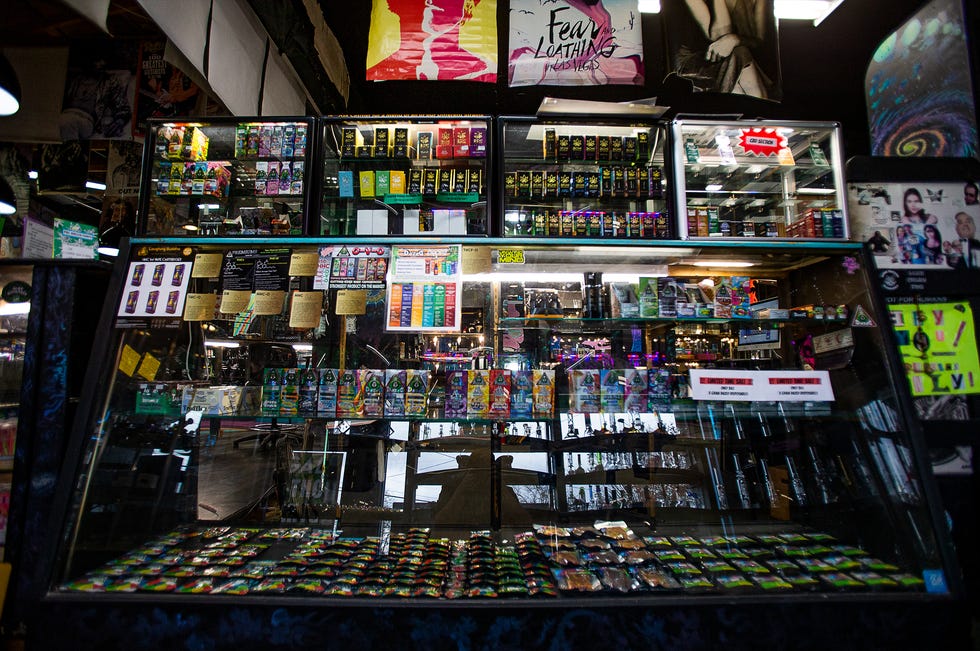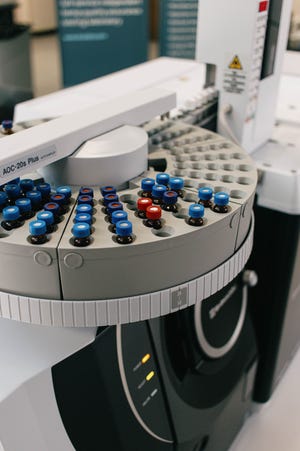Marijuana isn’t legal to sell in Kentucky, but a different substance that gets people high in basically the same way is being sold in shops across the state. It’s called delta-8 THC.
So what is delta-8, exactly? Is it safe? And why can it legally be sold in the commonwealth when even medical marijuana can’t? Here are the basics:
What is delta-8 THC?
Delta-8, sometimes described as “marijuana lite” or “weed lite,” can be indirectly synthesized from hemp, a cannabis plant now legal throughout the U.S.
Marijuana is sourced from other kinds of cannabis plants. Delta-9 THC is the component primarily responsible for the mental “high” people get from that drug, but hemp has very little of it.
Cannabis plants also produce other chemicals, or cannabinoids, including delta-8 THC, which has a molecular structure that’s almost exactly like delta-9’s.
Hemp plants, which look very much like marijuana, produce minimal delta-8. However, a lot more of it can be made synthetically from a non-intoxicating chemical called cannabidiol, or CBD, which can be extracted from the plants.
Delta-8 gets generated from CBD through a chemical process, after which it’s sold in products like vape cartridges and edibles.

Does delta-8 get people as high as marijuana?
When ingested, delta-8 causes mental and other physiological effects generally associated with getting high off the delta-9 in marijuana.
However, many people who’ve tried delta-8 products say it causes a less intense high, hence the nickname “weed lite.”
In a survey-based study conducted by University of Michigan researcher Daniel Kruger and University at Buffalo professor Jessica Kruger — who are married — 80% of participants said delta-8’s effects were less intense than delta-9’s.
“A lot of people have said: ‘This is my ‘work weed.’ I can use delta-8 and I can still do the things I need to do on a daily basis, but it gives me the benefits that I need,'” Daniel Kruger said.
In the survey about their delta-8 experiences, participants largely:
- Indicated relaxation, pain relief and euphoria were most prominent;
- Reported modest levels of “cognitive distortions such as an altered sense of time, difficulties with short-term memory, and difficulty concentrating;”
- Reported low levels of “distressing mental states” like anxiety and paranoia (which aren’t unusual with marijuana).
Kent Vrana, Penn State College of Medicine’s chair of pharmacology, however, is skeptical about the common assertion that delta-8 causes a milder high than delta-9, calling it “marketing hype.”
“The thing is there have been no very carefully controlled studies in which the exact same dose of THC was given, whether it was delta-8 or delta-9, and (given) in the exact same way,” he said.
How does delta-8 get people high?
Our bodies have an endocannabinoid system, and its functions include modulating our mood.
“Our brains and our bodies, on demand, make these molecules. They don’t look anything like THC or CBD, but they have their own receptors in the brain,” Vrana said.
Delta-8 and delta-9 THC can bind to those same receptors and make people feel high. “It hijacks a normal system,” Vrana said.
There’s plenty we don’t know about these relatively new products’ health effects. The general consensus for now: It depends on what’s in them.
The chemical delta-8 isn’t itself a problem, according to Vrana. “Delta-8 is no more dangerous than delta-9. And THC is much safer than my drug of choice, which is … a good, single-barrel bourbon,” he said.
However, the delta-8 on the market is made synthetically and is minimally regulated in Kentucky. Some testing has shown delta-8 products may contain heavy metals, chemical solvents and pesticides.
Using Delta-8 also involves some of the same risks that using marijuana does, Vrana said. Addiction, and specifically psychological dependence, is a possibility.
Heavy use also can trigger severe vomiting due to a rare condition called cannabis-induced hyperemesis syndrome, he said.
The U.S. Food and Drug Administration hasn’t evaluated or authorized delta-8 products “for safe use in any context.”

Can people use delta-8 like medical marijuana?
Anecdotally, some folks definitely are.
In the Krugers’ survey, 51% of the respondents said they use delta-8 to treat a health condition — issues like anxiety, chronic pain, depression and insomnia — and 29% said they use it exclusively for that purpose.
Amid research into medical marijuana, Vrana said data show it can stimulate the appetite and limit seizures, and there are indications it can help with pain management.
He said there’s no question delta-8 has similar potential uses.
Is delta-8 legal in Kentucky?
Yes.
The delta-8 market blossomed from nothing after Congress passed the 2018 farm bill and federally legalized hemp as well as various derivatives of hemp.
While delta-8 has been described as quasi-legal, a Boone Circuit Court judge ruled last year that it is legal in Kentucky.
That ruling did say delta-8 products wouldn’t be considered legal if they contain a concentration of delta-9 that’s higher than the federal limit for hemp, which essentially is 0.3%.
Is there ‘legal weed’ in Kentucky?
Recreational marijuana is not legal in Kentucky.
At the beginning of the year, an executive order signed by Gov. Andy Beshear went into effect that allows residents with specific health conditions to use medical marijuana as a form of treatment, but it must be bought legally in another state and strict limitations are in place on, for example, how much a person can possess at one time.
Reach reporter Morgan Watkins at mwatkins@courierjournal.com. Follow her on Twitter: @morganwatkins26.


Be the first to comment